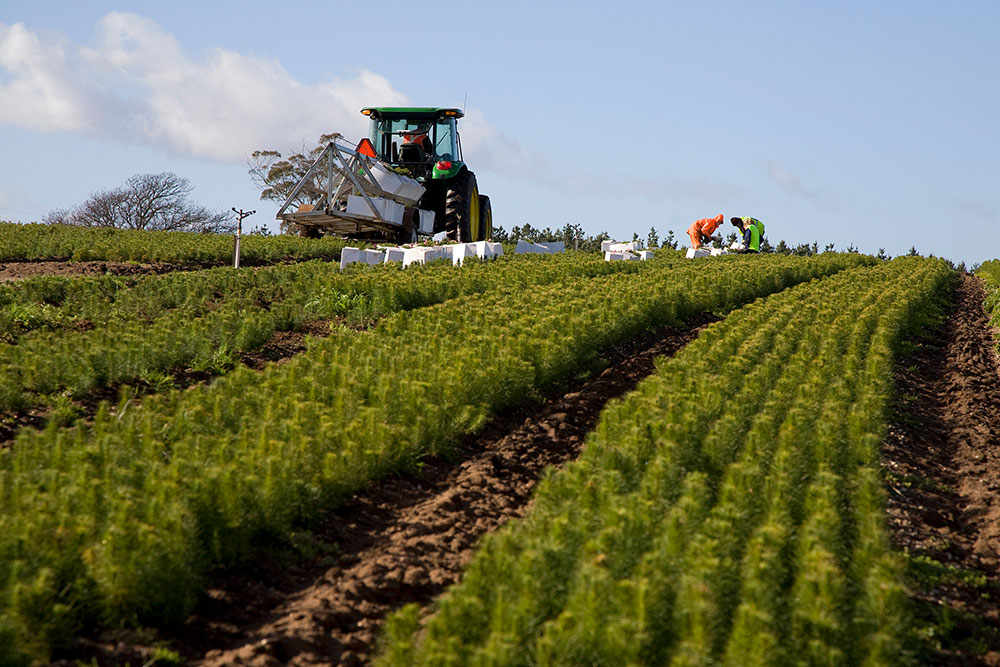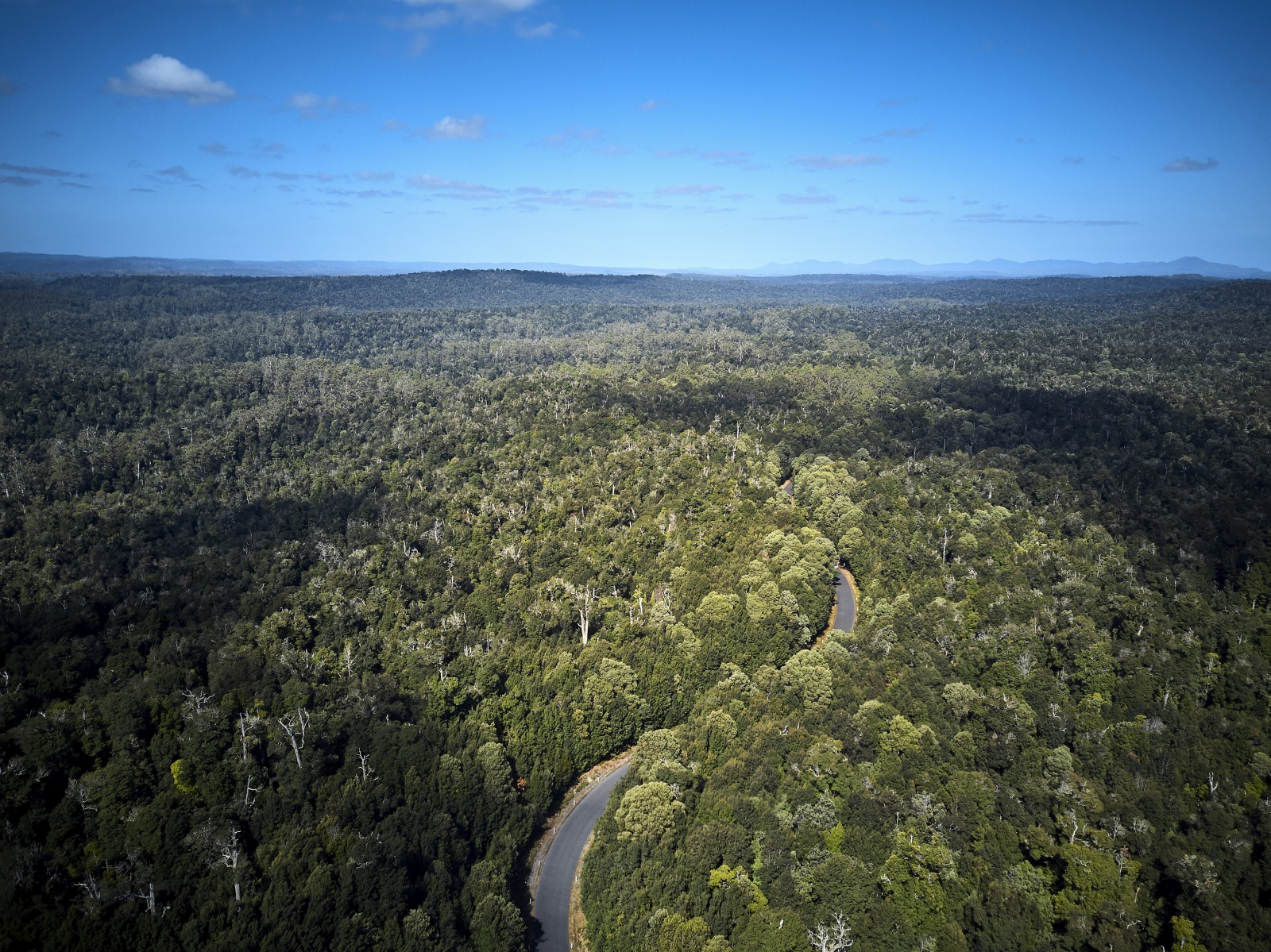Forest products
Tasmania’s forests are sustainably managed and provide social, environmental and economic benefits to the Tasmanian community.
Tasmania’s forests, fine timber and wood fibre industry is dynamic, highly diversified and constantly evolving to meet changing markets.
Tasmania’s forests are managed through a strict forest practices system including environmental, social, economic and sustainability principles and requirements

Sustainable management
The Tasmanian forestry sector is an integrated industry that encompasses both native forest and plantation resource. The industry is highly diversified and is able to adapt to changing market needs.
Tasmania’s forests are managed through a strict forest practices system including environmental, social, economic and sustainability principles and requirements.
In addition to our strong regulatory system, all of Tasmania’s industrial-scale plantations and public native forest estates are certified under independent third-party audited certification schemes. For example:
- Sustainable Timber Tasmania – the manager of Tasmanian native forest production estate – is certified under the Responsible Wood Standard, a certification scheme that was developed under accreditation by Standards Australia. This Standard is recognised internationally by the Programme for the Endorsement of Forest Certification. To ensure ongoing compliance with the standard, Sustainable Timber Tasmania operations are independently audited every nine months, with a major re-assessment occurring every three years.
- Forico – Tasmania’s largest plantation manager with around 90 000 hectares of plantation and 80 000 hectares of native forest – is certified against the Forest Stewardship Council® (FSC®) Forest Management Standard and the Australian Standard for Sustainable Forest Management for ‘Responsible Wood’

Biosecurity
As an island, Tasmania has a clear biosecurity advantage. Tasmania’s rigorous biosecurity standards are at the core of our advantage in natural environmental values and quality produce which rely upon the state’s freedom from pests, diseases and weeds.
Tasmania’s relative pest-free status offers additional opportunities to access a variety of international markets that are closed to other regions.

Tasmania's renewable energy
Tasmanian is Australia’s leader in renewable energy. We are in the enviable position of having a supply of renewable energy that meets the all of the state’s energy demands, including supporting mining and mineral processing.
As a state, Tasmania is 100 per cent renewable and has legislated an ambitious Renewable Energy Target to double our electricity generation to 200 per cent by 2040.
Tasmania also has enormous untapped potential in the area of renewable bioenergy.
In recognition of this, the Tasmanian Government has committed to and funded the development of a bioenergy vision for Tasmania, which will help make Tasmania a world leader in bioenergy investment and development

Private forests
Tasmania has 15 per cent of Australia’s plantation forest cover even though it only makes up one per cent of the nation’s landmass.
Our private forests now dominate our productive capacity accounting for approximately 75 per cent of total wood production.
All of our industrial private plantations have achieved certification under one or both of the internationally recognised Responsible Wood and/or FSC® schemes, providing a sustainable and community-supported supply of quality resource.
Private forest managers supply a range of products including sawn hardwood timber, hardwood veneer and special species timber as well as wood fibre.
Close to 440 000 hectares of Tasmania’s forested private land has been formally listed as private timber reserves, which are areas set aside for production forestry.

Public forests
There is approximately 800 000 hectares of public production forest in Tasmania.
Our public production forests are managed by Sustainable Timber Tasmania.
Our public forests supply a range of sustainably-sourced products including high-quality sawn hardwood timber, hardwood veneer and special species timber. Integrated harvesting of high quality products also creates a range of lower-value products and residues. At present these are largely exported into international woodchip markets, however there is a significant opportunity to increase the value-add from these products.
All harvesting on public production forest estates must be carried out in accordance with the requirements of the independent forest practices system. Sustainable Timber Tasmania has designed and implemented a comprehensive planning and operational framework to deliver its wood production and land management responsibilities and to protect important forest values across the landscape.
This means harvesting does not occur on around 40 per cent of the public production forest estates.
Sustainable Timber Tasmania holds a range of voluntary certifications, most notably Responsible Wood, recognised by the Program for the Endorsement of Forest Certification. Sustainable Timber Tasmania remains committed to achieving FSC® certification for its native forest estate.
In addition to its native forest estate, Sustainable Timber Tasmania has commenced working with industry to access its soon to be mature, FSC® certified, 20 000 hectares of sawlog quality hardwood plantations.

Innovation
According to the United Nations, global demand for wood is expected to triple by 2050.
Demand for building timbers and pulpwood is rising internationally. New markets are also emerging in the biomass energy generation market, further increasing the overall global demand for timber products and increasing forest values in Tasmania.
To meet this demand Tasmanian industry is at the forefront of collaboration and innovation. The Tasmanian Government is providing the framework to support projects, offering new processing and management options for Tasmanian wood.
Industry is also moving to divert some wood volumes which is currently exported into domestic processing of massive timber (Cross Laminated Timber and Glu-Lam), veneer, wood pellets and bioenergy.
In addition to wood products, the industry is at the forefront of the development of innovative new uses for wood such as pharmaceuticals, food additives, clothing, and environmentally friendly chemicals.
A key part of the Tasmanian Government’s framework to drive the use of wood is the Wood Encouragement Policy. The policy encourages the use of wood, including for biomass heating and associated energy generation for all Tasmanian government building projects and was the first such policy implemented by an Australian state government.
This approach, which is consistent with the views of international experts, is that active forest management and the use of timber in long-term products can play a critical role in our overall carbon pollution reduction strategy.
Timber is the only major building material that helps tackle climate change. It is both naturally renewable and an abundant resource. Natural forests and timber plantations are net absorbers of greenhouse gases, wood products store carbon and substitute other carbon emissions intensive products, such as steel and concrete.


